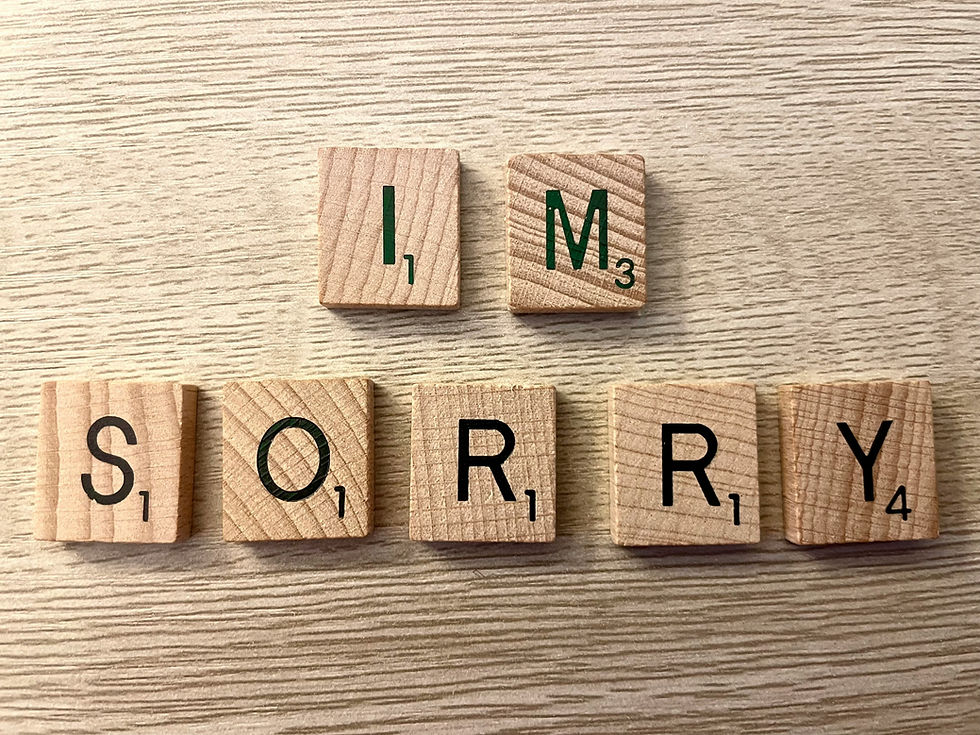Why Is Apologizing Important in a Healthy Relationship?
- Elena Padurariu

- 20. Nov. 2024
- 3 Min. Lesezeit

Coming from a culture where apologies are rare, I’ve had to learn and appreciate just how important apologizing is in maintaining strong, healthy relationships. Understanding this concept has shifted my perspective and helped me offer greater support to people seeking my assistance.
Apologizing is essential for repairing a conflict with a partner, family member, close connection, or even with a stranger. It should always be followed by a genuine effort to change the behavior that caused hurt. A heartfelt apology can be incredibly healing, helping to release feelings of pain and anger in the person who was wronged. Without this, resentment can build, weighing down the relationship and creating lasting damage.
What Makes a Good Apology?
Some apologies are straightforward; a simple “I’m sorry” may be enough for minor mistakes. However, for more significant hurts, a more thoughtful approach is required. Author J. Kador defines an effective apology as:
“We apologize when we accept responsibility for an offense or grievance and express remorse in a direct, personal, and unambiguous manner, offering restitution and promising not to do it again.”
One of the hardest aspects of apologizing is sitting with and listening to someone’s pain, especially when they are accusing us of causing it. Our natural reaction is to focus on what we believe is unfair or incorrect about their accusations. Yet, genuine listening is critical.
How to Be a Better Listener During Conflict
Listen with empathy and curiosity. Seek to understand the other person’s experience by asking clarifying questions.
Take a tactical pause if you notice your anger is increasing; think about the consequences of losing your temper.
Set boundaries if needed. If you’re not ready to listen, it’s okay to say, “Not now” or “Not in this way,” to avoid tolerating disrespectful behavior while still taking responsibility for your actions.
Why Apologizing Can Be Difficult
Some people struggle more with apologies than others, and several factors play into this:
Cultural Differences: Our family upbringing and cultural background shape our views on apologies and forgiveness. Some cultures emphasize them heavily, while others do not.
Perfectionism: Those with perfectionist tendencies often have difficulty apologizing because admitting a mistake feels like a threat to their self-worth. It takes strong self-esteem to admit wrongdoing and embrace vulnerability.
Shame and Guilt: Intense feelings of shame or guilt can make it excruciating to apologize. Shame, in particular, can devastate self-esteem, causing people to either withdraw or flip to defensiveness, arrogance, and control.
How to Encourage an Apology
Apologies are a dynamic exchange, and the person requesting one may unknowingly make it harder to receive. Here are some ways to lower defenses and encourage sincere reconciliation:
Stick to the present issue: Avoid bringing up past mistakes, even if they feel related. This reduces defensiveness and keeps the conversation focused.
Critique behavior, not the person: Respectful language is crucial. Shaming might force an apology, but it won’t inspire genuine reflection or growth.
Keep criticism balanced: Remember, the other person is responsible for their actions, not for managing your emotional response.
Be concise: Over-explaining your hurt can lead the other person to shut down. Briefly express your pain to create space for understanding.
Request, don’t demand: Demanding an apology can make the other person feel humiliated and less likely to respond positively. Requests create an opportunity for genuine remorse.
The Power of a Genuine Apology
Learning to give and receive sincere apologies has immense power to heal and restore connections. However, reconciliation isn’t guaranteed without lasting behavioral change. Apologizing is part of an ongoing process of self-reflection, awareness, and developing empathy for those we’ve hurt, making it an invaluable tool for personal and relational growth.



Comments